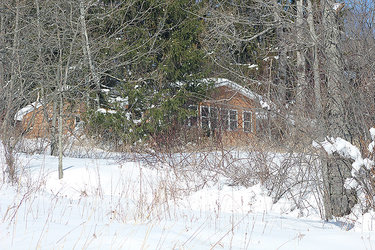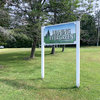Tenants told to leave Switzkill Farm because sprinklers don’t work
BERNE — The shutting down of a town-owned building last week by the newly-appointed building inspector, forcing its two tenants to leave, has riled several Berne officials and created further strife around the town-owned property of Switzkill Farm.
The two tenants, Nelson Kent and Diane Poole, were asked to leave by building inspector Chance Townsend, who was appointed at the beginning of the year, after he discovered smoke detectors and a sprinkling system weren’t working; he issued an order to vacate, said Berne Supervisor Sean Lyons.
The tenants were given just a few hours to vacate on Feb. 27, with temperatures in the 20s.
Kevin Crosier, the former town supervisor who had lost to Lyons in the November election, said that Poole had called him after she was was asked to leave. Crosier was supervisor when the property was purchased by the town.
“The woman was in tears; she was hysterical,” said Crosier.
Poole, a Buddhist, has lived in a retreat house at Switzkill Farm since the town bought the property from a Buddhist community three-and-a-half years ago.
Members of the Switzkill Farm Board praised the tenants when they met on Tuesday evening. Karen Schimmer recalled Poole gathering apples from the orchard on the property to make cider and Scott Green told a story of her warning him to watch out for a grouse while brush hogging because “he lives here.”
“Everybody loved Diane,” said Schimmer.
“She had a deep connection to the place,” said Green.
Lyons told The Enterprise last Wednesday that he had asked for code enforcement officer Chance Townsend to conduct a fire safety inspection at Switzkill Farm on Tuesday, Feb. 27. Townsend had determined that there were code violations and issued an order to vacate that afternoon, Lyons said.
“There’s an ongoing investigation, and I’m not at liberty to talk about it,” Townsend told The Enterprise last Wednesday.
The supervisor said that Townsend, who is a member of the Switzkill Farm Board, was the only town official present when the inspection and order to vacate were issued. He said that the two residents left without any altercation.
Lyons said that the fire suppression system — sprinklers, light indicators, and smoke detectors — was not functioning properly, though he was not sure why.
“We’re having the company who installed it, they’re coming out to do an inspection on the system,” the supervisor said on Wednesday, adding that the company was expected to arrive the following day.
“I don’t believe that there was anything immediately life-threatening,” he said.
Lyons said that the fire extinguishers were replaced in the buildings at Switzkill Farm.
“Our only goal is to make these buildings safe,” he said.
Lyons wrote in an email to The Enterprise this Wednesday that he had no further comments, “Until the Building and Zoning Administrator for the Town of Berne completes his investigation and corrective actions and releases his report to the Berne Town Board … .”
Frank “Ted” Kunker, the chairman of the Switzkill Farm Board, said that the tenants alive in a retreat house on the Switzkill Farm property on a month-to-month lease.
“I’m very upset the way it was handled,” said Kunker.
Kunker described the retreat house as a single-story building with seven rooms and two communal bathrooms. He said that the suppression system had been turned off because the retreat house has not been operated as a hotel, and that, as far as he knew, no one had ever arrived before to conduct an inspection.
Frederick “Lee” Jones, the Switzkill Farm Board treasurer, told The Enterprise that the rent the tenants paid is a nominal amount of money, though he declined to state the amount, and that the loss of the income is less of a concern to the board than the loss of such nice people as these tenants.
Kunker said that Lyons had visited the property on Feb. 17 to do a walk-through of Switzkill Farm after a tenant provided him keys to the buildings. Ten days later, the building inspector arrived and issued a notice to vacate, he said.
“A reasonable period of time is not two hours’ notice of eviction,” said Kunker.
He added that no other town officials were contacted about the matter. Instead, Kunker was emailed by a tenant on Wednesday and spoke to this tenant on the phone. He then contacted Schimmer, a town councilwoman and town board liaison for the Switzkill Farm Board.
Schimmer, a Democrat, had been named by Lyons, a Republican, at the town’s Jan. 1 reorganizational meeting, to be deputy supervisor. Dennis Palow, the other newly-elected Republican on the formerly all-Democratic town board, has since been named as deputy supervisor, according to the town’s website.
Schimmer told The Enterprise last Friday that she had not known initially about what had happened at Switzkill Farm before being contacted. She said she had contacted other town board members and they had also not known about the incident.
Switzkill Farm Board responds
At the Switzkill Farm Board meeting held on Tuesday night, Schimmer told the board members that she had little information to share with them. She had spoken with Kent, and also had learned from the town that Townsend, who was not present at the meeting, had met with the fire-alarm and sprinkler companies on Monday and that only minor repairs were needed and the alarm system needed to be looked at.
Schimmer said that the town intends to check the fire extinguishers annually from now on, and that the town board would be meeting soon to discuss the matter.
The Switzkill Farm Board members expressed their concern over the town’s decision to order the tenants to vacate the retreat house.
Roger Chrysler, who farms the hayfields on the 350-acre property, said that he had seen smoke alarms hanging from the ceiling by wires. Kunker said that a resident had disconnected the alarms when they started beeping but he wasn’t sure when. While some smoke alarms such as in the lodge at Switzkill are individual battery-operated devices, the retreat house alarms are wired to one another.
Green, a former town maintenance worker, said that he had monitored the buildings on the property and had heard the occasional beep from an alarm but never saw them disconnected. Townsend is the current maintenance worker, and Green said Townsend has held that position for about a year-and-a-half.
“I’m personally offended that Chance didn’t change the smoke detectors,” said Green. He later added that the buildings should be monitored every couple of days.
Board members agreed that the buildings should have some kind of regular checks. Richard Ronconi noted that, particularly without any tenants, the buildings could potentially go without visitors for weeks at a time.
Ronconi, a board member who rents out property, said he thought what the town had done was illegal by evacuating the tenants without providing housing.
“You don’t say, ‘OK, you’ve got to get out of here,’ when it’s a matter of replacing batteries,” he said.
Kunker had told The Enterprise that Poole is staying in Vermont and is considering remaining there because of the situation with the town. He also said that she has been active in programs at Switzkill Farm.
“She kind of acted as a makeshift caretaker,” he said.
Kunker noted at the meeting that some of what Poole did included checking on things on the property for the board, and the town would likely be losing that service. Ronconi replied that she had said in an email that she would not be returning.
He told the board that, while he thought the situation could have been handled differently, Townsend may have made his decision based on news that a Schenectady housing inspector, Kenneth Tyree, had been charged with criminal negligence after inspecting a building and failing to notice the alarm system was not working. The building burned down the next day in a fire and four people died. A jury cleared Tyree of felony manslaughter charges this week.
Kunker also said he was concerned with why Lyons had apparently toured the buildings himself 10 days before asking Townsend to conduct an inspection.
“If it’s a safety issue, you don’t wait ten days,” he said.
Kunker said that Townsend is the fire marshal, giving him the authority to evacuate the building.
Ronconi made a motion to suggest that the town board establish regular, documented walkthroughs of the buildings at Switzkill Farm. Terry Schwendeman seconded the motion, and all members voted in favor of this.
Ronconi also asked if the Switzkill board should suggest that the town board write a letter of apology and invite the tenants back. Kunker said he doubted that the town attorney would allow such a letter to be sent but said it could still be suggested, and the board members voted in favor of this, as well as agreeing to write their own letter to the tenants.
In a letter to the Enterprise editor, Ronconi described how the GOP candidates who had campaigned and won town seats this fall had expressed wanting to sell Switzkill Farm; Ronconi believes the new administration has not appreciated the work the board has done.
In a similar letter, Switzkill Farm Board member Mark Hohengasser mentioned that there had been the spread of negative “fake news” about Switzkill Farm in social media posts. Posts on the Facebook page The Happenings in the Town of Berne NY, which has drummed up support for Republican candidates, have promoted the idea of selling Switzkill Farm.
In a text message to The Enterprise, Schimmer said that tenant Diane Poole, a Buddhist who had lived on the property when it was still owned by a Buddhist community, has volunteered for Switzkill Farm and is “genuinely kind, respectful to all, and possesses an innate, quick intelligence and delightful sense of humor. Diane gave much, took little, and will be sorely missed if she does not return,” she said.
Schimmer also said that tenant Kent has attended almost all the Switzkill Farm Board meetings and has “volunteered his energy, direction and acumen to just about every venture undertaken … .”
Kent told The Enterprise that he has attended most meetings of the Switzkill Farm Board and was recently appointed to the board.
The tenant’s tale
Kent told The Enterprise on Saturday that Townsend came by on Tuesday and said that the tenants would not be allowed to spend the night.
“I was OK with that; I have a place to go,” said Kent. He said that he is staying at a friend’s apartment in Troy and was already planning to travel to Texas.
Kent said he had stayed at the retreat house part of the time when it was run by the Buddhist community. Although he is a Buddhist, Kent said that he was not a part of the group that had owned the property. He started a lease with the town to live there full-time in January 2017, after a job he had been doing in Woodstock ended. He said he liked the environment at Switzkill Farm.
“It just feels natural to me,” he said.
Kent said he is a semi-retired engineer and is also the director of the Buddhist study and meditation center Albany Karma Thegsum Chöling, or Albany KTC.
On Feb. 17 or 19, the supervisor arrived at Switzkill Farm, accompanied by highway superintendent Randy Bashwinger and Councilman Dennis Palow, said Kent. The three are all Republicans. The supervisor asked him for the key to the lodge, so Kent showed them the retreat house and then gave them the key. The three town officials went to the lodge but did not visit any other buildings on that day, said Kent. He added that the lodge and the retreat house are the only buildings on the property in use. Kent said that there was no mention of violations at the time.
Kent said that Townsend called the tenants a few hours before he arrived to inspect the property around 4 p.m. Shortly after, Kent said, that the tenants could not stay there overnight. The notice was such so short because, at 4 p.m., it was fairly close to nighttime, although there was no given time they had to leave. The sun set at 5:42 p.m. on Feb. 27.
“You can come back there during the day, do whatever you want, but you can’t stay overnight,” Kent said he was told.
Kent said that Townsend had found fire-code violations and was trying to do the right thing by addressing them. He said Townsend had been very polite and professional, and clearly felt bad asking the tenants to leave.
He said that he spoke to Kunker on the phone and emailed him and Schimmer.
“They were very apologetic and felt bad … ,” he said. “They felt concerned for me.”
Kent said that Poole was upset by the situation and believes she wouldn’t be returning to live in Berne.
“She wasn’t happy about the situation,” he said.
Kent said that Poole had told him that the smoke alarms had gotten too old to work effectively, and that she had known this but he had not been aware of it. He also thought the sprinkler system worked as well.
Kent said that the Buddhist community had kept a monthly water log to report to the health department and kept regular inspections and maintained a permit for temporary housing. This inspection is the first Berne has done, he said.
“I was only there a year so I wasn’t aware that they hadn’t inspected, too be honest,” he said.
Kent said that the town had returned his rent check for the month of March.
“That’s a good gesture,” he said. “If it’s less than a month that I’m away, that’s a nice gesture.”
He said he hopes to return to the retreat house after his trip to Texas, as he enjoys living there.
“I can’t say how my life is going to go,” he said.
Code enforcement
Tim Lippert, who served as the code enforcement officer before Townsend, said that he was concerned that Townsend serves as the property caretaker; the code-enforcement officer; and is an employee of the tenants’ landlord, the town.
“There’s a number of ways that Mr. Townsend could have handled what he found,” said Lippert, who said that a single-story residence does not need a sprinkler system, and that a sign could have been put up stating that the system did not work.
Lippert said that he had never officially inspected the buildings at Switzkill Farm, but said that he had reported concerns about code violations to the town board and to the Switzkill Farm Board, and said that members told him they were seeking grant money to remediate this.
A model law from the New York State Department of State indicates that ordering an occupant to vacate the premises can be an appropriate response to a code violation, and the 2015 International Property Maintenance Code states that, if there is “imminent danger” of the structure collapsing, there is danger due to fumes or explosives, or defective equipment, the code enforcement officer is authorized to order the occupants to vacate.
Peter Lattanzio, president of C&L Inspections Services, told The Enterprise that a property owner, in this case the town, must provide a working smoke alarm, and would be authorized to have occupants vacate the property if unable to remediate the problem right away.
“That is a life safety device,” said Lattanzio of the smoke alarm. The retired chief of Colonie’s Fire Services department, Lattanzio also teaches courses on code enforcement and fire safety and is the fire safety inspector for the organization Living Resources.
“If the sprinkler system was mandated by code to be there, which I’d guess it would be … so again, it’s a life safety device,” he said.
Lattanzio pointed out that smoke alarms and sprinklers work in tandem. A fire-suppression system is meant to stop a fire from spreading even though it often does put it out, while alarms alert the residents.
“So, if that’s a required system, then the town would be on good ground — code-wise and morally — to get the people out of there,” he said.
Lattanzio said he would guess that the sprinkler would be required to be there, but said that building codes can change if the use of a building changes.
“But the fact is, if the system is there, it’s required to be maintained and in service,” he said, adding that the alternative is to remove the system. This is in part because it can give a false sense that sprinklers would go off in a fire.
These systems have to be repaired by a sprinkler company contracted specifically to do this, said Lattanzio, rather than have someone unqualified make repairs. Smoke alarms also require more effort to install than at a commercial level.
“There’s a difference between a smoke detector in your house and a smoke detector in a school,” he said. He added that it is not as simple as “buying one from Home Depot.”
Lattanzio noted that many people change their home smoke alarm batteries when they advance their clocks for daylight saving time, which is approaching. But he said smoke alarms themselves, “have a shelf life” of about 10 years before the sensors that detect smoke stop being as effective. The same goes for carbon-monoxide detectors. However, new smoke alarms being sold in New York State are required to be sold with a non-replaceable battery that lasts for 10 years, meaning that the alarms have to be replaced within the decade.
Robert Magee, the director of the City of Albany Department of Buildings & Regulatory Compliance, said that, if there were violations such as at Switzkill Farm, the city building inspectors typically put the building on a fire-safety watch and attempt to remediate the problem in a matter of hours. If the problem can’t be resolved quickly, a notice to vacate may be issued, which Magee referred to as declaring a building “unfit and unsafe.”
Magee said that the city tries to inform tenants of the differences between this declaration and an eviction, and that they still have rights to the building.
“We don’t ever physically remove a person from the property,” he said.
The building department also will offer housing for tenants through the Red Cross or the Homeless and Travelers’ Aid Society, said Magee.
Looking out for tenants
Erin Reale, the executive director of the United Tenants of Albany, a group that works to improve housing conditions and offers advice to tenants, said that there is no law in New York State that requires landlords to provide housing or reimbursement for housing should they be forced to leave their homes temporarily, though a landlord must make as much of an effort as possible to remediate the situation quickly. However, tenants may be able to have recourse for costs incurred in a civil suit, said Reale.
“The right thing to do is to give the renter a home,” she said.
Reale noted that an order to vacate is different than an eviction. Tenants, for example, can still return to the building briefly to get belongings when given an order to vacate, she said.
Reale said that, while it is good to promote fire safety, she has not heard of smoke alarms or sprinklers being a reason to close a building down.
“Why would that be enough to shut it down?” she pondered.
Crosier, a retired city of Albany firefighter, said that he had worked as a code-enforcement officer for the fire department for years and regularly inspected apartments with broken or non-working fire alarms. Crosier said that the landlord would be notified and given time to fix the problem.
The former supervisor said he could not recall if there had been any previous inspections conducted at Switzkill Farm.
In the town’s “Unsafe Buildings and Collapsed Structures Ordinance,” it states that if the code enforcement officer determines a building is unsafe, he must report his inspection in writing to the town board with his recommendation of what to do. The town board would then determine what to do next.
In Berne’s building code, the code-enforcement officer is allowed to revoke or suspend a building permit if it is determined that the building no longer complies with the building code. The building code also states that buildings operating as dormitories or with places of public assembly must have annual fire safety and property maintenance inspections; inspections must occur every three years at multiple dwellings and nonresidential buildings.
The building code also states that if there is a violation of a town code, a court order can be obtained to remediate the violation, but only with authorization from the town board.



